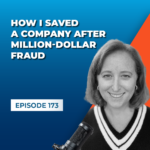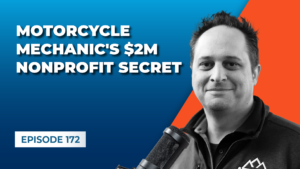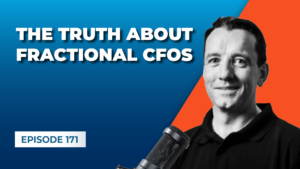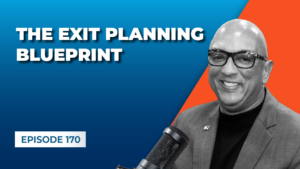In this episode, James Kennedy sits down with Debbie Rosler, fractional CFO at Burkland, to dig into the uncomfortable but critical topic of waste, fraud and abuse inside venture-backed startups. Drawing on a career that spans investment banking, private equity, Levi Strauss, dot-com startups and a career-defining embezzlement case where a CEO “borrowed” $1.5M from his own company, Debbie walks through exactly how it happened, why the board didn’t catch it, and the practical controls that saved the business. They also explore how SaaS founders can use “two sets of eyes,” approval matrices and even purchase orders with lawyers and contractors – and why phishing, payment-redirection scams and AI deepfakes make 2025 a dangerous time to be casual about controls. James closes by introducing redflag.procurementexpress.com, a 30-second AI QuickBooks scan that flags unusual spending patterns before they blow up into a crisis.
About Debbie Rosler
Debbie Rosler is a fractional CFO at Burkland, where she’s spent the last decade supporting early-stage, venture-backed companies from pre-seed through Series B and beyond. After earning a finance degree from the University of Michigan, she started her career in investment banking and private equity before completing her MBA at Stanford. Debbie then spent nearly 10 years in finance and strategy roles at Levi Strauss, followed by multiple startup finance roles in the Bay Area.
At Burkland, she now works primarily with SaaS and other venture-backed startups, helping founders and boards implement smart financial controls, build reliable reporting, and navigate everything from capital raises to crisis situations when controls have failed.
What You’ll Learn
- How a CEO stole $1.5M – and why nobody noticed for two years
The step-by-step story of a founder who “borrowed” increasing amounts from the company, took on new debt, and quietly siphoned out a total of $1.5M before the business literally couldn’t make payroll. - The hidden red flags in board decks and financial reporting
Why constantly changing the format of the finance section in board packs helped obscure what was really going on – and why Debbie says the finance section should be the most boring, consistent part of your board deck. - Two sets of eyes: the simplest control that stops most fraud
How splitting responsibilities between “preparing” and “releasing” payments (for wires, ACHs, checks, reimbursements and vendor bills) dramatically reduces internal fraud, external scams and simple mistakes like extra zeros. - When early-stage SaaS companies should start using POs and approval matrices
Why Debbie still sees POs as essential for high-value professional services (lawyers, tax advisors, pricey contractors) and how approval thresholds by role (director, VP, CEO) keep scaling teams from committing unplanned spend. - Modern phishing, bank-change scams and AI-powered fraud
What Debbie learned from the Silicon Valley Bank crisis and subsequent wave of “we’ve changed our bank details” emails, how to validate new payment instructions safely, and why multi-factor authentication and independent callbacks are now non-negotiable. - How a fractional CFO rebuilds trust after a fraud event
The playbook Debbie used to clean up the books, work with forensic accountants, reassure investors and lenders, re-establish controls, and ultimately give the company a second chance at life.
Episode Highlights
- “The core of financial controls is simple: any time cash leaves the company, you want two sets of eyes on it.”
- “Your finance section in the board deck should almost be boring. If it looks different every time, it’s much easier to hide what’s really going on.”
- “Legal is often the single most expensive vendor a startup has. Setting clear expectations up front – ideally in a PO – can save you from some very ugly surprises.”
- “Phishing and payment-redirection scams spike whenever people are changing banks. If someone emails you new routing details, you never just reply to that email – you call a known contact on a known number.”
- “You can’t retro-fix financial controls after the money’s gone. You have to put them in while things still look ‘fine.’”
More About Debbie’s Role
At Burkland, Debbie provides fractional CFO support to venture-backed startups – typically from pre-seed or seed through Series B/C, often in the $2M–$100M revenue range. Within Burkland’s broader team of 800+ client relationships and services covering accounting, tax and HR, Debbie focuses on:
- Designing and implementing financial controls (two-person payment approvals, bank access rights, approval matrices and travel policies).
- Building consistent, board-ready financial reporting that gives investors confidence and surfaces issues early.
- Helping founders decide when to layer in tools like bill-pay platforms, expense platforms and purchase order systems to balance control with speed.
- Supporting companies and lenders in special situations – such as fraud clean-ups – so the business can stabilize, raise additional capital and move forward on stronger footing.




